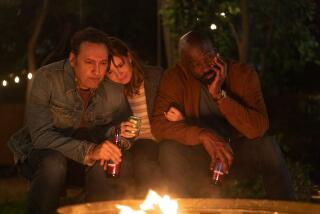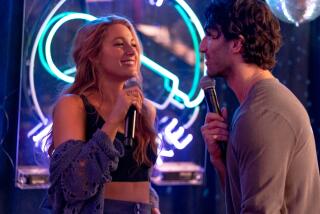‘The Leftovers’ recap: Kevin is homeward bound
- Share via
Everything in life is a construct, a cobbled-together narrative that we tell ourselves in an attempt to struggle through another day.
That may sound disheartening, as though everything we believe in is merely a facade, but in reality, the constructs we fashion aren’t necessarily fabrications, as much as they are fables crafted to make sense of things that seem senseless.
Take, for instance, the Sudden Departure on “The Leftovers,” an event that saw 2% of the world’s population disappear. It was an unthinkable tragedy, one that the world had never seen before and left survivors reeling in its wake.
But what makes the Sudden Departure a tragedy? Is it that there’s no explanation for it? Or that it happened in one fell swoop?
At one point in the finale of “The Leftovers’” sterling second season, Michael stands before the congregation of his church and sets the record straight about the story his mother Erika was fond of telling about he and twin sister Evie in the bathroom when they were just 5 years old.
The tale that Erika recounted was one of Evie’s precociousness, flooding the bathroom because she wanted to see what would happen. In reality, Michael and Evie were in the bathroom with the water running because Evie was loudly sobbing because their father went away and no one could tell her why.
Michael concludes his speech by saying that no one may have disappeared from Jarden during the Sudden Departure, but they disappeared before and they disappeared after.
In a way, Michael’s speech is reminiscent of a series of tweets by renowned astrophysicist Neil deGrasse Tyson from a few weeks ago, discussing the raw numbers of American gun violence. Specifically, Tyson references the 3,400 Americans killed by terrorism since 2001, to the roughly similar number killed by gun violence every five weeks.
The point being that while all loss is tragic, some resonate on a higher frequency, whether they should or not. The Sudden Departure was a tragedy, but tragedies happen every day.
Damon Lindelof created in “The Leftovers” a beautiful show about the petty grievances of grief, simultaneously creating an environment where everyone’s sorrow is acceptable and understandable, while also indicting them for not seeing that there were people hurting long before anyone disappeared.
Throughout Season 2, Kevin Garvey has been lost in his own construct, a slave to his visions of Patti, having fought death to try and preserve the family he thought he wanted. In the finale, resurrected from a shallow grave and renewed, confident that any misunderstanding could be worked out, he looks to make peace with John and share his realizations about the night Evie died.
But John hasn’t had the same opportunity for revelation as Kevin and Kevin’s handprint on Evie’s car, his admission about seeing Evie and the girl that night faking their own disappearance, as well as Kevin’s assertions that he knows what Virgil did to John as a boy, were all too much to bear, and so he shoots Kevin in the gut before being pulled away because Evie has reappeared.
Kevin, though, is not dead. Or, rather, he is dead, for now, again. In a sick twist of fate, he returns to the hotel he spent the whole of “International Assassin” trying to escape, but this time, he knows better how his choices affect the whole of his experience. Instead of the suit, Kevin chooses the police uniform, and in short order is summoned to the lobby for a disturbance.
Once there, he meets a familiar face. The Australian chap who warned him on the bridge in “International Assassin” is now holding court in the bar area, running karaoke. The man is mysterious and Kevin knows him only from their previous otherworldly encounter, but demands answers from him. He wants to go back to his life, his family, to the realm of the living, but the mysterious man only mocks him, informing him that pleading to return is what everyone does before telling Kevin that the only way he’ll be allowed to go back is if he performs.
The moment is hilarious. For that matter, the whole of “I Live Here Now” is hilarious, shot through with moments of stark honesty and matter-of-fact delivery of outlandish concepts. The reason it works so well is the same reason why it’s so easy to inappropriately laugh at a funeral. You laugh, lest you cry, because tragedy and heartbreak are just as ridiculous as farce when it comes to trying to process them.
But when Kevin Garvey is standing on a stage in a dimly lit bar, in the hotel that serves as the gate between life and what lies beyond, there is no humor. Tasked with singing Simon and Garfunkel’s “Homeward Bound,” he is struck with the profundity of the yearning in the lyrics and commits to his performance, unwavering, as his nose runs and he is blinded by the spotlight, Kevin perseveres, hoping for another chance at a place to call home.
For Kevin, though, what is home? Is it Mapleton? Is it Jarden? Is it pre-departure life where he was disinterested and disconnected, in a home he shared with Laurie and Tommy and Jill? Or is it the post-departure family he clings to with Nora and Lily and Jill? Or is home the opportunity for Kevin to start a new life on his own?
When he returns successfully to his own time and place, Kevin finds Jarden in ruin. The Guilty Remnant had followed through on Meg’s plans to destroy the place, using Evie and the missing girls as keys to opening the gates and bringing all of hell with them.
It’s a hellscape, one that even Kevin’s loyal dog is unable to face with him, now freed from his cage at the quarantine. So Kevin stumbles through the flaming streets of Jarden, still bleeding profusely from the through-and-through gunshot wound and toward the clinic for anything that might keep him alive.
When there, he finds John, who, though shocked by Kevin’s continued existence, is so shaken by the events of the day and the fact that Kevin was likely telling the truth about it all, that he aids him both in cleaning his wound and taking him home.
They part, veterans of the same war, and Kevin assures John that if no one is home at his house, he should come back to Kevin’s, where he will be welcomed. The question, though, is who will be home at Kevin’s? Who does Kevin want to be there?
Everyone. The answer is everyone. Everyone is there waiting to welcome Kevin home. Laurie and Tommy and Jill. Nora and Lily, Matt and a newly awakened Mary. All are present to welcome their broken love home and to build something better moving forward.
Family is a construct. Life is a construct. Survival is a construct. Religion is a construct. But these are the constructs that move us forward and give us reason to fight our way back from the brink.
“The Leftovers,” in its simple beauty, understands the importance of being known. The title of its finale, “I Live Here Now,” is reminiscent of the words of poet Adrienne Rich, who wrote in “An Atlas of the Difficult World,” “—this is where I live now. If you had known me once, you’d still know me now though in a different light and life.”
Though the world outside them is in ruins, inside Kevin’s home there is the safety and comfort of being known, no matter what. For what may very well be the final episode of HBO’s “The Leftovers,” that’s as good and as blessed a place to leave their characters as any.
Follow me on Twitter at @midwestspitfire.
ALSO:
‘Homeland’ recap: Authorities have 24 hours to avert terrorist attack
‘Once Upon a Time’ recap: Elliot Knight’s ‘youthful’ and ‘less intense’ Merlin made waves
Review Bill Murray’s naughty ‘n’ nice ‘Very Murray Christmas’ belongs on an all-year-long wish list
More to Read
The complete guide to home viewing
Get Screen Gab for everything about the TV shows and streaming movies everyone’s talking about.
You may occasionally receive promotional content from the Los Angeles Times.







